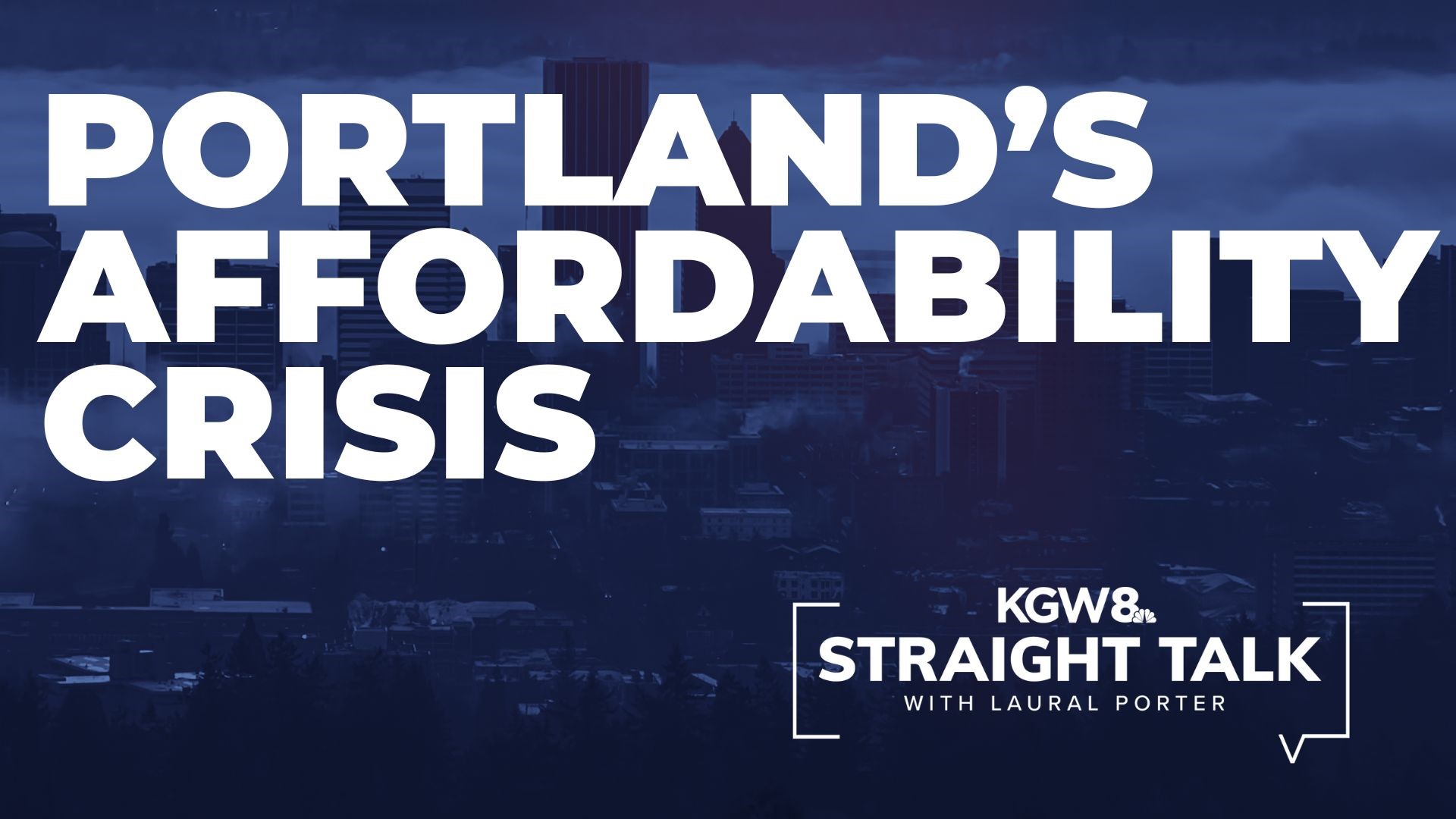PORTLAND, Ore. — While Portland leaders have touted recent progress on metrics like crime, new polling shows that many people in the metro area remain deeply pessimistic about their quality of life and how it compares to the area's cost of living.
The polling comes from the Portland Metro Chamber, formerly known as the Portland Business Alliance. The group takes an annual assessment of voter sentiments, and they commissioned local firm DHM Research to conduct a survey of 500 voters in the tri-county area late last year. Portlanders made up half of the people polled.
On week's episode of "Straight Talk," Portland Metro Chamber's President Andrew Hoan, DHM Research President Michelle Neiss and ECOnorthwest Director of Analytics Mike Wilkerson discussed the recent poll and why Portland has struggled with affordability.
Over half of people surveyed, 51%, felt that the Portland region was on the wrong track, compared to 26% who felt it was heading in the right direction. That sentiment was more pronounced in Multnomah County, where 69% felt it was on the wrong track. An overwhelming percentage, 78%, felt that quality of life was getting worse — a figure that remained flat from last year.
RELATED: Gov. Kotek, Portland Central City Task Force release recommendations for revitalizing downtown
When asked to name their biggest concern, 40% named homelessness — by far the most commonly mentioned topic, and an increase over 2022's 34%. Distant runners-up were crime and public safety, drug use or addiction, and affordable housing.
Most issues that DHM asked respondents to rank remained the same from recent years, although cost of living overtook crime for the first time since 2020.
DHM's survey identified a spike in people saying that they were worse off financially in 2023, with 49% saying as much compared to 38% in 2022. This was largely driven by residents outside of Portland. For the first time, an overall negative outlook on economic opportunities in the area outweighed a positive one, although the two remained closely matched.
Over half of those surveyed said that they'd visited downtown Portland within the past 30 days. Older respondents, Republicans and residents of areas outside of the city were far less likely to have visited — demographics with considerable overlap.
Perceptions of safety in downtown Portland remained dismal, with 55% of respondents saying that they felt unsafe there during the day and 81% feeling unsafe at night. However, those numbers were a slight improvement over polling done in 2022.
The poll also revealed rising anti-tax sentiments, particularly in Multnomah County where voters have historically been willing to bear new taxes. In all, 69% of respondents said that taxes were too high for the services provided, an increase over 2022 that was driven entirely by voters in Multnomah and Clackamas counties.
Support for specific taxes like Metro's Supportive Housing Services tax, Multnomah County's Preschool for All tax and Portland's Clean Energy tax have all slipped, though each still had the support of at least a plurality of polled voters; in the case of Metro's homelessness tax, it was just 48% in support compared to 47% in opposition.
Trust in local elected leaders also continued to scrape the bottom of the barrel, with just 25% reporting that they trusted officials. That was down from 35% in 2022, amid an overall slide from a now-unthinkable 63% back in 2019. The only time polls showed lower trust was in 2021, when it hit 25%.
Both representatives from DHM Research and the Portland Metro Chamber acknowledged that public opinion might not reflect the facts on the ground, which have shown signs of improvement, and that sentiments can be difficult to rescue and slow to recover after an event that had as much negative impact as the COVID-era in Portland.
"You see a cliff (in 2001), and you see another cliff in 2021," said John Horvick, senior vice president of DHM Research, referring to the question about whether people think Portland is heading in the right direction. "What you don't see, ever, at least in our historical record, is big spikes up. ... It's easier for people to turn sour than it is for people to turn positive."
December was downtown Portland's highest month for foot traffic since the pandemic, according to Jon Isaacs, executive vice president of public affairs for the Portland Metro Chamber — their best month in five years.
"We agree there are definite signs of progress," said Isaacs. "But, at the end of the day, we also have to respect the perspective that residents of the region have, and understand that we are in for a long haul until people who live here, voters, taxpayers start to feel that difference, and we're not there yet."
Horvick and DHM President Michelle Neiss both suggested that, to some extent, it's a matter of the stories that people continue to hear and the stories they've become used to telling themselves.
"I do think we've been telling ourselves a negative story for a long time, and it's really hard after you've been telling everybody — your friends, your colleagues, everything — that things are bad, to start saying that things are good," Horvick said. "I think that's a lot harder for people to change in a positive direction. So, what is the time lag? I think it's difficult to measure, but I do think we should expect it to be much slower coming out than it is falling down."
"Straight Talk" airs Friday at 7 p.m., Saturday and Sunday at 6:30 p.m. "Straight Talk" is also available as a podcast.

